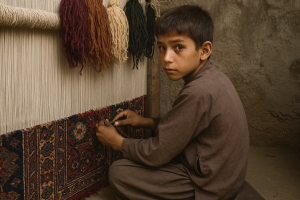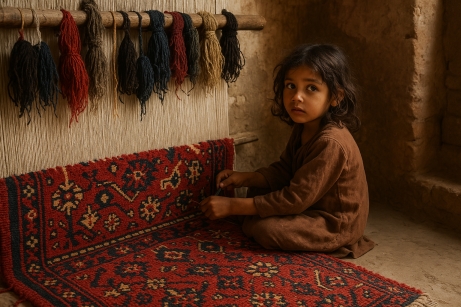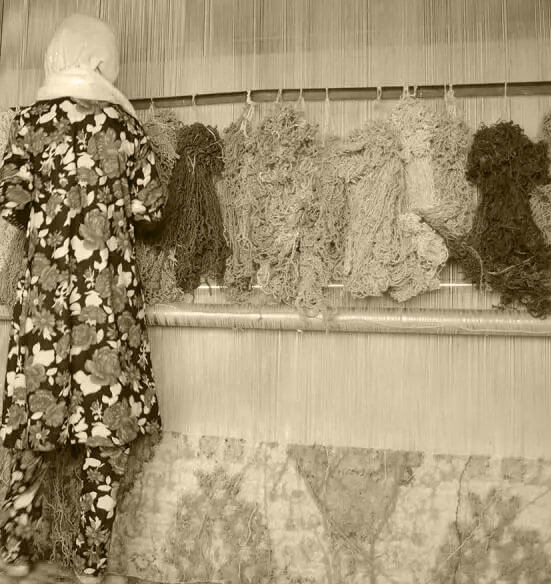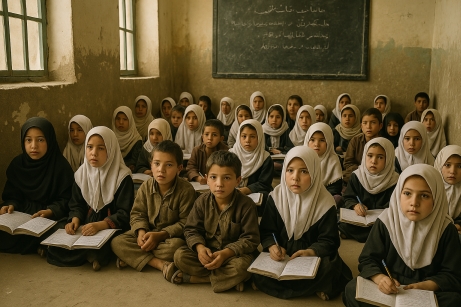Child labour in the production of Afghan carpets?

Child labour is a sensitive and complex issue with no simple solution. However, CarpetDepo is committed to instilling a love and respect for handcrafted carpets without contributing to any form of exploitation. For our customers, this is not only an aesthetic choice, but also a value choice. Handmade Afghan rugs are sought after around the world for their exceptional quality, unique designs and artisan traditions. At the same time, these beautiful products can in many cases be associated with serious social issues - first of all the problem of child labour.
These lines do not deny that these problems exist. They simply ask the reader to look beneath the surface - to see the humanity, the human fate, the complexity of the historical and social context. The oriental carpet is not just an ornament - it is a culture, a survival, a hope, and sometimes the only source of a child's smile in a dark world, that has been passed down through the centuries.

Child labour behind the Afghan carpet - a more nuanced reality
According to a report by the US Department of Labour, Afghanistan is one of the countries with the highest incidence of child labour in the production of handmade rugs. This is true!!! But the reality is much more complex and profound than that.
The making of authentic oriental rugs is a craft with thousands of years of tradition, requiring great skill, patience and dedication. This knowledge is passed down through generations, often from a very young age. Afghan children are indeed involved in some stages of carpet making - but in nowhere near the conditions imagined from thousands of kilometres away.
In Afghanistan, abject poverty and the human and economic tragedies of war have forced many families to rely on all able-bodied family members, including children, to contribute to the family's livelihood. Many children have no choice: they either work or, in the saddest cases, beg on the streets to provide a meal for their siblings. This is the reality! And unfortunately, it is not rare. For many Afghan children, childhood is a bitter experience. They could have been born in another country where they could go to school and play in the park. Most Afghan children are not so lucky. Their "sin" is that they were born in the wrong place. They too have to work to put food on the table. This does not mean they are condemned to slavery. Especially as most of the Afghan rugs are knotted by all the carpet makers in their own homes.
Most Afghan handmade carpets are made in homes, not factories. Families are provided with the necessary yarn, weaving loom, pattern material and tools to make the rugs in their own homes. It is natural for children to help with the knotting work here - as in many other traditional crafts around the world. There is no large-scale, exploitative production in nomadic carpet making: it is a culture of communal, family work. Carpet weaving is one of the easiest tasks that children can do. There are parts of the country where children are forced to do very hard physical work. But the most unfortunate thing is when they don't even have work, because in such cases, they sell one of their children to feed the others. Unfortunately, this is not uncommon and believe me, no, another family in Afghanistan buys the sold children.... The information shared gives an authentic and true picture of the human side of Afghan carpet making. I have seen it with my own eyes and not from news reports because I was born in Afghanistan. It is therefore particularly painful and unfair when an entire nation is branded with one-sided, false or out-of-context accusations. Of course, all efforts to protect children should be supported - but with real, effective solutions. International organisations such as UNICEF campaign against child labour - but experience shows that they rarely offer a real alternative for families living in poverty. Prohibition in principle alone will not help. Change requires jobs, educational opportunities, food security and long-term support.
It is important to stress that carpet making should not be seen as forced labour or an inhumane burden. Rather, it is an opportunity for survival and, in many cases, a more dignified alternative for children than the streets or other forms of exploitative physical labour.
The truth is that the greatest tragedy is not when a child knots a rug with his or her family - it is when there is nothing to knot, no yarn, no order, no vision. That is when the worst can happen: when a family is forced to part with one child to feed the others.

In times of war, most Afghan carpets are sent to Pakistan, where they are unfortunately labelled 'Made in Pakistan', even though they are made in Afghanistan. No country has a trade agreement with Afghanistan. There are not many opportunities in Afghanistan, but carpet making can remain a strong pillar of handicrafts. When you put a hand-knotted carpet in your home, think about how much work has gone into it and how many families have made a living from it. Our carpets are lovingly made for our future customers. Have a look around www.carpetdepo.eu I am sure you will find the carpet that is closest to you.
CarpetDepo's commitment to human rights and sustainability
Respect for human rights is a priority for CarpetDepo, which is why we avoid families and manufacturers (from Afghanistan, Pakistan, India, Iran and Turkey) who prioritise children's educational opportunities over work. Our efforts are aimed at creating a more just and sustainable world, where every child has the opportunity to benefit from learning, far from exploitation. This ethical approach is key to us and we are committed to using sustainable techniques in our manufacturing processes in Afghanistan. We believe that every child has a fundamental right to learning and healthy development and we strongly oppose all such activities and practices.

The background of child labour in Afghan carpet making
In Afghanistan, handloom weaving is not just a job but a centuries-old family tradition. The art of carpet making is passed down from father to son, mother to daughter, and often the basic skills are passed down from an early age.
In a country plagued by war and political instability, poverty is unfortunately widespread, especially in rural areas. For the majority of families, children's work is an essential supplement to the family income, whether it be raising livestock, farming or carpet weaving. This practice is not always exploitative - it is often part of the family unit - but children often work several hours a day and do not attend school.
International legal background
There are a number of international conventions to combat child labour. Convention 138 of the International Labour Organisation (ILO) sets a minimum age for employment, while Convention 182 prohibits the worst forms of child labour, such as exploitative physical work or strenuous activities that are hazardous to health.
Afghanistan is a signatory to both conventions, but the legal frameworks often fail to translate into everyday practice - particularly where the state has a weak presence and the primary goal of providing for families remains to secure their livelihoods.

The role of education and NGOs
Strengthening Afghanistan's education system is key to reducing child labour. Building school infrastructure, training teachers and ensuring girls' access to education are all factors that can help tackle the problem in the long term.
Many international and local organisations are working to improve the situation. UNICEF, Save the Children and GoodWeave International have various programmes to support children's school attendance and monitor industrial supply chains to exclude child labour.
The economic importance of Afghan rugs
Carpet making is one of the most important sectors of the Afghan economy. The livelihoods of hundreds of thousands of people, including women and men, urban and rural communities, depend directly or indirectly on this industry. Afghan carpets are renowned for their delicacy of hand-knotting, natural raw materials and traditional patterns, often evoking motifs that are hundreds of years old.
However, international markets are increasingly focused on ethical and transparent production processes. Consumers demand that the products they buy should not only have aesthetic value but also social responsibility. The carpet industry must therefore adapt to new challenges.
The Afghan Carpets
Afghan carpet is a type of hand-knotted textile that is made in Afghanistan using traditional methods. Afghan carpets have won several international awards at the annual international Domotex exhibition in Hanover, Germany. Afghan carpets are made by different ethnic groups in Afghanistan. Mostly Turkmen Afghans make carpets in the north and west of Afghanistan (Aqcha, Mazar-e Sharif, Herat). One of the most exotic and distinctive of the eastern carpets is the Khalmohamadi or Aqcha (Afghan city of Aqcha), knotted in the Balkh province of northern Afghanistan. The carpet is available throughout Afghanistan, with the largest quantities available in Mazar-e Sharif. The founders of Carpetdepo are also from this city. Another typical carpet of Afghanistan is the Baluchi carpet. These are made by the Baluchis of Afghanistan in the southwest of the country.
They use various natural vegetable dyes to produce the beautiful warm colours. A wide variety of patterns and colours are used, but the traditional and most typical is the octagonal elephant print, often with a red background. The elephant foot pattern dates back almost 1000 years. The knotters also make other accessories for the nomadic lifestyle, including tent bags, wall coverings, coasters and saddle bags.
